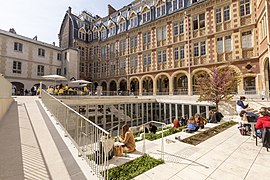dates Gospels early
Part Two:
Institut Catholique de Paris ignores Carmignac
“The Catholic weekly Il Sabato has been hunting down his manuscripts. It discovered that
Fr. Carmignac’s entire archive is to be found at the Institut Catholique in Paris where he
had taught. In all these years, the Institut Catholique has taken care not to tend to the publication of those pre-announced works, and, above all, it has prohibited people
from seeing the material when they ask to see it ...”.
The Wanderer
In the 1990’s, colleague Frits Albers (RIP), PH.B, wrote about what he considered to be the “betrayals” perpetrated by Paul Cardinal Poupard, the Archbishop of Paris, including his complete snub of the research of Fr. Jean Carmignac.
...
History has recorded several major betrayals by Cardinal Paul Poupard, Archbishop of Paris and president of its Institut Catholique. I will briefly describe two of them here as an introduction to his major one, his ‘resolution’ of the Galileo Case.
PART ONE: WHY I MISTRUST CARD. PAUL POUPARD
Here follows the official text of this “public put-down”, issued by the Holy See press office on July 11, 1981, as it appeared in the Osservatore Romano of July 20 1981, mentioning Archbishop [by then not yet Cardinal] Paul Poupard by name.
The letter sent by the Cardinal Secretary of State to His Excellency Mons. Poupard on the occasion of the centenary of the birth of Fr. Teilhard de Chardin has been interpreted in a certain section of the press as a revision of previous stands taken by the Holy See in regard to this author, and in particular of the Monitum of the Holy Office of 30 June 1962, which pointed out that the work of the author contained ‘ambiguities and grave doctrinal errors’.
The question has been asked whether such an interpretation is well founded. After having consulted the Cardinal Secretary of State and the Cardinal Prefect of the Sacred Congregation of the Faith, which, by order of the Holy Father, had been duly consulted beforehand about the letter in question, we are in a position to reply in the negative. Far from being a revision of the previous stands of the Holy See, Cardinal Casaroli’s letter expresses reservations in various passages - and these reservations have been passed over in silence by certain newspapers - reservations which refer precisely to the judgment given in the Monitum of June 1962, even though this document is not explicitly mentioned.
The second example of betrayal involving the Institut Catholique of Paris and its president, Archbishop Paul Poupard, centres on interference with the dissemination of truth by means of the direct and wilful suppression of Catholic scholarship in favour of a free and unencumbered promotion of doctrinal errors. The scandal appeared in the March 19, 1992 edition of the American Catholic paper The Wanderer, quoting two other major European Catholic periodicals, 30 Days and Il Sabato.
Reporting a scandal: An editorial in the current issue of 30 Days magazine (issue no. 2), titled “Scandal at the Institut Catholique” raises some tough questions about the openness of modern biblical scholars to research which offers evidence that the Gospels were written by A.D. 50.
Reporting on investigative work conducted by the Italian Catholic weekly Il Sabato the editorial asks why the Institut Catholique in Paris will not allow to be printed, or even acknowledge the existence of, the biblical scholarship of Fr. Jean Carmignac.
Fr. Carmignac, until his death in 1986, was one of the world’s leading experts in Hebrew and Aramaic, and his extensive research in language and the Fathers of the Church led him to believe Matthew, Mark, and Luke had written their Gospels by A.D. 50.
In addition, Carmignac noted the scholarship of 49 other recognised experts who agreed with him, but whose works also had either been ignored or censored or else they did not dare wage a battle in the name of their scientific conviction.
“For the consequences”, stated the 30 Days editorial, “would have revolutionised the dominant exegetical trends today. Many ideas, whose certainty is taken for granted today, would have crumbled ... If the Synoptic Gospels were written in a Semitic language it means they were written soon after Jesus’ years on earth, when the protagonists were still alive. It means that the Synoptic Gospels are the testimonies of people who saw and heard, of witnesses to the facts. It means they are not late elaborations by anonymous transcribers of popular traditions”.
In 1983. Fr. Carmignac published a small book containing his findings and conclusions, and promised a later book which he described as “more convincing than ever and, I hope, irrefutable”.
But at that time an effort began to bury his work, the editorial said, under hefty shovelfuls of earth ... Six years after his death, none of these texts has ever been published. An impenetrable curtain of silence has fallen on Fr. Carmignac and his work. The Catholic weekly Il Sabato has been hunting down his manuscripts. It discovered that Fr. Carmignac’s entire archive is to be found at the Institut Catholique in Paris where he had taught. In all these years, the Institut Catholique has taken care not to tend to the publication of those pre-announced works, and, above all, it has prohibited people from seeing the material when they ask to see it ...
One of the 49 scholars mentioned here by the late Fr. Jean Carmignac is, no doubt, Claude Tresmontant whose magnificent book on that very same topic, The Hebrew Christ, carries a lengthy foreword by the Most Reverend Jean Charles Thomas, Bishop of Ajaccio, dated May 1, 1983: three years before the death of Fr. Jean Camignac. In his Foreword Bishop Thomas refers specifically to the same general state of affairs as was reported by the three Catholic papers mentioned above. There is no change of heart in either the ‘Institut Catholique’ or its president, Paul Poupard ...

No comments:
Post a Comment